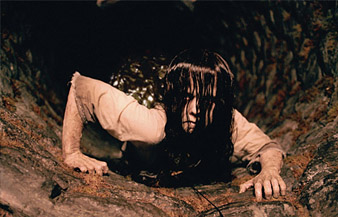Chapter Two: The Ring Two
By Brett Ballard-Beach
December 6, 2012
Where The Ring Two does falter (although it is a problem that The Ring shares to a lesser degree) is with a pair of protagonists that remain resolutely enigmatic, verging on unlikable. Perhaps that initially attracted Watts – who, King Kong aside, never seems to pick movies that are obvious commercial projects or have much chance to become blockbusters - to the role. Rachel Keller is in no way the conventional female protagonist of a horror film: a professional single mother in her 30s with brains and no social life. Watts does more for the role than it does for her, but Rachel’s relationship with her son is quirky at best, mystifying most of the time. She is part helicopter mom, part third-party observer. He insists on calling her by her first name. In no conventional sense do they enact a parent-child relationship - most times, it resembles the emotional tenor of the babysitter or next-door neighbor getting sole custody after both parents have been tragically killed - and I will allow that this creates schisms with the desire of a mainstream audience to identify with or connect with the characters they are observing. Compounding matters, the preternaturally grave Dorfman plays Aidan as a slightly less humorous version of Haley Joel Osment’s character from The Sixth Sense.
And yet, thanks to the intensity of Watts’ performance, Rachel’s love for and protective feelings towards Aidan are never in doubt. When Rachel drops her guard to her boss in The Ring Two and spills the whole ridiculous story of what’s happening, knowing that he may think her crazier than he already does, Watts underplays, keeping up a wall of reserve even as she threatens to break down. Several other performers are allowed to make notable impressions with minimal screen time. In the opening scene, Emily VanCamp conveys the indecision of the nice girl torn between her desire and her unease. Elizabeth Perkins pops up as a psychiatrist for child services who seems poised to become prominent in the proceedings, before one of the most unexpected and bizarre character exits I can recall. Gary Cole brings his patented smarmy charm to a glad-handing realtor, who has a fairly conventional exit (though one hopes he would come back) and Sissy Spacek gets jittery and foreboding as the mental patient who may hold the answer to past mysteries (but speaks mostly in cryptic clichés.)
As I mentioned at the top, despite this version running 18 minutes longer than the theatrical version I had seen, I didn’t pick up on any pacing issues that would reflect padding of any kind. Almost every scene in the film pushes the main storyline forward (or maintains the eerie ambience that blankets the film). What I can’t wrap my head around is what the film wants to say (if anything) about the nature of evil, and the horrific act of parents being driven to murder their children. The film makes some stabs towards Samara’s lineage, suggesting a supernatural conception reminiscent of mythological gods procreating with mortals, but either refuses to provide an answer or keeps it’s reasoning intentionally murky. “Post-partum depression” is tossed about skeptically (effectively demonizing or ridiculing women who have suffered from it.) Samara has supposedly always been evil, and yet appears to have been an abused child as well. Rachel must “drown” Aidan (and “kill” herself) in order to save him. The family ties that bind.
The Ring Two is that rare Chapter Two that effectively killed the franchise (although of course there have been rumblings as of late of a new installment - a sequel/reboot and most likely in 3D) and that alone made it interesting to me. But there’s an inherent tension to it as well that encapsulates a lot of what this column has been about in examining sequels - between repeating what worked and breaking the mold, reaping commercial rewards and risking audience alienation. When it works (spectacular imagery such as the water flowing upward towards the ceiling in a bathroom) it finds a way to burrow itself just under your skin. When it fails (as with The Ring, the climax on top of the climax proves to be too much, even as it bring events full circle), it’s like the gutter reaching for the stars. The falling short becomes that much more interesting.
Next time: A Chapter Two first, and my 37th birthday present to myself. One sequel, two takes. It’s Lester vs. Donner, the Man of Steel vs. himself, Superman II vs. Superman II.
Continued:
1
2
3
4
|
|
|
|




